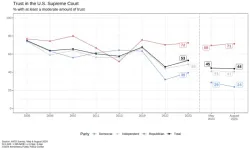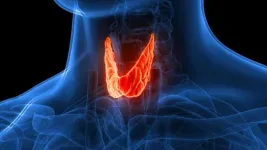(Press-News.org) Providing care for a family member with a disabling illness can be a demanding job that leaves many people unable to sleep, but an online insomnia treatment developed at the University of Virginia School of Medicine can help, new research shows.
Not only did the SHUTi (Sleep Healthy Using the Internet) sleep intervention help caregivers get better rest, it most benefited those shouldering the greatest responsibilities in caring for their loved ones, the researchers found.
The results suggest the online format of the program holds great promise for helping people access insomnia treatment who otherwise could not because of their demanding caregiving responsibilities, the investigators say.
“Compared to the general population, caregivers are more likely to experience insomnia but have a harder time getting help for this problem,” said researcher Kelly M. Shaffer, PhD, a clinical psychologist at UVA Health who is part of UVA’s Center for Behavioral Health and Technology. “Effective and accessible Internet-based interventions like SHUTi can give more caregivers meaningful relief.”
Caregivers and Insomnia
Approximately one in six Americans provides physical, emotional or medical care for a loved one disabled by illness. This can place a huge emotional and physical toll on caregivers. Many end up stressed and sleep-deprived but still struggle to fall asleep even when they have the opportunity.
SHUTi has helped many people overcome sleep difficulties in previous research trials. Shaffer and her fellow researchers wanted to see if this intervention, and the cognitive behavioral therapy it provides, would be helpful for caregivers.
To determine that, the researchers provided SHUTi to 100 “high-intensity” caregivers struggling with insomnia. Of those, 60 completed the program, while 22 started but did not finish it. Of the 18 who didn’t use the program, most said they had not because of concerns about the time it would require and fitting it into their caregiving obligations. Overall, the verdict was very positive, with most participants who used the program finding it user-friendly and seeing benefit in the cognitive-behavioral strategies provided.
Notably, the most engagement and the best outcomes were largely seen in participants with the most challenging caregiving situations. In particular, caregivers reporting more guilt about taking time for their own well-being at the start of the study tended to show some of the greatest improvements in their sleep quality and number of awakenings through the night. Many of these caregivers appreciated that SHUTi gave them space to focus on their own health goals.
Users also said that they liked that SHUTi helped them manage their feelings of stress, anxiety and overwhelming responsibility. This made it easier for them to stop their minds from racing as they tried to fall asleep, the researchers report.
The results suggest that SHUTi could be a useful tool for helping busy caregivers access insomnia treatment they might not be able to get in person. Further, the research suggests that the program is helpful as is, even without custom tailoring for caregivers, such as content on how to fall asleep more easily after helping a loved one during the night. Still, this tailored information may be helpful for some caregivers, and the researchers hope to study this next.
“Family caregivers fill an irreplaceable role in their loved ones’ healthcare teams,” Shaffer said. “In turn, they deserve care for their own health concerns that is effective, affordable and practical. Our study provides hope that Internet-based interventions like SHUTi can make that a reality.”
Findings Published
The researchers have published their findings in a pair of papers in the Annals of Behavioral Medicine. The research team consisted of Shaffer, Daniel J. Buysse, Heidi Donovan, Jillian V. Glazer, Julie Klinger, Meghan K. Mattos, Kate Perepezko, Lee M. Ritterband and Wen You. The authors’ disclosures are included in the papers.
The research was supported by the National Institutes of Health’s National Center for Advancing Translational Sciences, grant NCATS R21TR003522.
To keep up with the latest medical research news from UVA, subscribe to the Making of Medicine blog.
END
Online insomnia treatment can help caregivers get much-needed rest, study suggests
2024-10-02
ELSE PRESS RELEASES FROM THIS DATE:
Attivare licenses Wyss Institute’s immune-modulating biomaterial technology to advance immunotherapies
2024-10-02
Attivare licenses Wyss Institute’s immune-modulating biomaterial technology to advance immunotherapies
The company is developing the biomaterial-based technology to develop novel therapies able to program anti-cancer immunity and prevent infectious diseases
By Benjamin Boettner
(BOSTON) — Today, the Wyss Institute for Biologically Inspired Engineering at Harvard University and Attivare Therapeutics Inc. announced that Attivare has licensed a portfolio of immune-modulating biomaterial technologies from Harvard University that was created at the ...
Regenstrief, Fairbanks researcher among 25 fellows to be inducted into American College of Medical Informatics
2024-10-02
The American College of Medical Informatics (ACMI) has announced that Chris Harle, PhD, of the Indiana University Richard M. Fairbanks School of Public Health and the Regenstrief Institute will be inducted as one of 25 new fellows on November 10 in San Francisco, CA, at ceremonies during the American Medical Informatics Association (AMIA) 2024 Annual Symposium.
ACMI is a college of elected fellows who have made significant and sustained contributions to the field of biomedical informatics. Individuals who have achieved national recognition in the field and are committed to advancing ...
Ontario Institute for Cancer Research funding aims to speed the development of new drugs for some of the most common cancers
2024-10-02
October 2, 2024, TORONTO – The Ontario Institute for Cancer Research (OICR) continues to support Ontario drug discovery research by funding high-quality investigations of new therapies for some of the most prevalent pediatric and adult cancers. These projects are tackling substantial challenges in cancer by increasing the effectiveness and availability of immunotherapies, making cancer more vulnerable to chemotherapy and developing a new drug for one of the deadliest forms of childhood brain cancer.
OICR’s Cancer Therapeutics Innovation Pipeline (CTIP) initiative is supporting three research teams ...
Trust in US Supreme Court continues to sink
2024-10-02
PHILADELPHIA – Driven by political partisanship, public trust in the U.S. Supreme Court has continued a downward slide since the court’s 2022 Dobbs decision overturning the Roe v. Wade ruling that established a constitutional right to abortion, according to a new survey by the Annenberg Public Policy Center (APPC) of the University of Pennsylvania.
More than half of Americans (56%) now disapprove of the Supreme Court, saying they trust it either “a little” or “not at all” to act in the best interest ...
Rice’s Biotech Launch Pad to lead commercialization of bioelectrical implant treatment for obesity, type 2 diabetes
2024-10-02
Rice University is part of a multiuniversity research team that has secured an award of up to $34.9 million from the Advanced Research Projects Agency for Health (ARPA-H) to accelerate the development of a bioelectronic implant designed to improve adherence for obesity and type 2 diabetes (T2D) treatment while reducing development and manufacturing costs.
Rice University’s Biotech Launch Pad will lead the commercialization effort for “Rx On-site Generation Using Electronics” (ROGUE), a self-contained, durable implantable device that houses cells engineered ...
Carnegie Mellon to lead development of implantable cell-based bioelectronic devices for patient-specific treatment and disease monitoring
2024-10-02
PITTSBURGH – A Carnegie Mellon University-led team has secured an award of up to $42 million from the Advanced Research Projects Agency for Health (ARPA-H) to accelerate the development of implantable, cell-based bioelectronic devices that deliver patient-specific therapy and monitor disease status, for conditions like hypo- and hyperthyroidism, in real time. This award is part of the ARPA-H REACT program, which supports the advancement of implantable bioelectronic devices to improve patient management of chronic diseases.
Burak ...
Case Western Reserve, Vanderbilt universities to develop incisionless prostate surgery using MRI and robotics
2024-10-02
CLEVELAND—Researchers at Case Western Reserve University and Vanderbilt University are pioneering a new approach to prostate cancer surgery by combining advanced robotics and “low-field” MRI technology.
The research aims to allow highly accurate, patient-tailored prostate cancer surgeries without the need for traditional incisions. This innovative research marks a major step in developing minimally invasive treatments for prostate cancer, with the potential to improve both safety and efficiency for patients.
The project is being funded by a new five-year, $3.7 million grant from the National Cancer Institute, part of the ...
Carnegie Mellon University secures ARPA-H award to improve adherence, lower cost of treatment for obesity and Type 2 diabetes patients
2024-10-02
PITTSBURGH – A Carnegie Mellon University-led team of researchers has secured an award of up to $34.9 million from the Advanced Research Projects Agency for Health (ARPA-H). The funds will fast track a bioelectronic implant that could radically improve treatment options and significantly reduce the cost of care for patients with obesity and Type 2 diabetes.
The award will drive the accelerated development and testing of “Rx On-site Generation Using Electronics (ROGUE),” a bioelectrical device that hosts a “living pharmacy,” consisting of engineered cells that produce biological therapy to treat Type 2 diabetes and obesity. The device will offer continuous, ...
A new injectable to prevent and treat hypoglycemia
2024-10-02
People with diabetes take insulin to lower high blood sugar. However, if glucose levels plunge too low — from taking too much insulin or not eating enough sugar — people can experience hypoglycemia, which can lead to dizziness, cognitive impairment, seizures or comas. To prevent and treat this condition, researchers in ACS Central Science report encapsulating the hormone glucagon. In mouse trials, the nanocapsules activated when blood sugar levels dropped dangerously low and quickly restored glucose levels.
Glucagon is a hormone that signals the liver to ...
Turning plants into workout supplement bio-factories
2024-10-02
It’s important to eat your veggies, but some essential vitamins and nutrients can only be found in animals, including certain amino acids and peptides. But, in a proof-of-concept study published in ACS’ Journal of Agricultural and Food Chemistry, researchers developed a method to produce creatine, carnosine and taurine — all animal-based nutrients and common workout supplements — right inside a plant. The system allows for different synthetic modules to be easily stacked together to boost production.
Plants can be surprisingly receptive when asked to produce compounds ...







